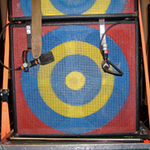Shih Chieh Huang
Pepe and Popcorn
Virgil de Voldère Gallery
526 West 26th Street, Room 416, New York, NY
February 25–April 10, 2010
In his second exhibition at Virgil de Voldère Gallery, Shih Chieh Huang introduces us to Pepe and Popcorn, two new creatures in his resplendent cosmic sculptural ecosystem. Resembling magical sea anemones and pulsating bioluminescent jellyfish, these works, with their categorically nonorganic parts, also evoke clunky interstellar spacecrafts. Hung like baroque chandeliers, Pepe and Popcorn—which are constantly clicking, bleeping, turning, whirring, whistling, bubbling, and breathing—seem alive and curious. What are they so excited about? Are they chatting with each other in some kind of creaky, squeaky robotic language, passing time in the gallery with idle conversation? It sometimes feels as if they’re looking at us, perhaps in the same inquisitive way we gaze upon them. Are Pepe and Popcorn trying to speak to us?
As two vast, extreme locations with seemingly endless possibilities for exploration, the deep sea and outer space have much in common. Art is a third region of tremendous imaginative discovery. Combining all three, Huang the artist plays both the Jacques Cousteau explorer (he held a recent residency at the Smithsonian Museum of Natural History studying ocean life) and the amateur rocket scientist. To build his works, he rummages though the Electric Towns of Japan and Taiwan—districts of shops selling all sorts of electronics, toys, gadgets, and circuitry—while also scouring the Internet for ordinary household devices. Garage-door openers, miniature fans, timers from Christmas lights: he acquires such things only to pick them apart and repurpose them completely. The moving parts and deceptively simple technologies that bring Huang’s works to life look fresh and significant in the face of slick digital movies or high-end electronics.
Viewers and critics have connected Huang’s use of plastic bags and bottles to a stance on ecology or environmentalism—understandably so, as his work looks like the miraculous spawn of an aquatic invertebrate and the refuse from the fabled plastic continent floating in the Pacific Ocean. Yet he actually chooses his bottle from the grocery shelf, not the recycling bin, and he’s interested in the aesthetic value of its shape and design. (Likewise, he also requests his bags new from the store, often befuddling the cashier.) Huang removes the object from its normal circulation and transforms it in a way that eclipses its utilitarian origins.
In addition to this exhibition, the Telfair Museum of Art in Savannah, Georgia, is featuring Huang’s work in the Lewis Gallery of the Jepson Center of the Arts. Presented in conjunction with the museum’s “2010 Pulse: Art and Technology Festival,” the installation, called Counterillumination (C-2010), will be on view from January 21 to April 4, 2010.
